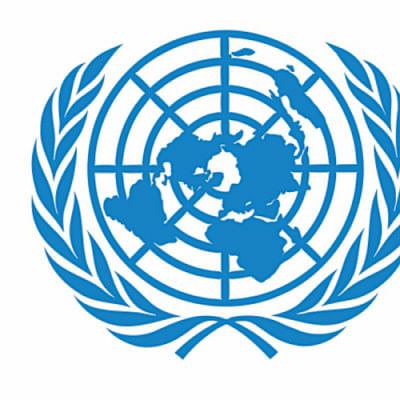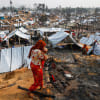Myanmar playing tricks on UN too

Myanmar has been playing tricks not only on Bangladesh but also on the United Nations Security Council over the repatriation of Rohingyas since September last year.
It promised the UNSC that it would take measures for a voluntary and safe return of the refugees to avert criticisms from the high-powered UN body. But Myanmar itself made the repatriation difficult through some steps, including tightening the criteria for verification of Rohingyas.
Ahead of the UNSC visit, Myanmar prepares to garner support from the council in favour of its strategies on the Rohingya issue.
The Myanmar government high-ups have said they will explain their efforts to resolve the crisis to the UNSC delegation. This indicates that the country may play the same old trick on the team members banking on the tricky repatriation deal it had signed with Bangladesh in November last year.
Despite its promise to the UNSC, Myanmar has not yet taken adequate steps to improve the atmosphere conducive to voluntary and safe return of the Rohingyas. International rights bodies still voice concern over the atmosphere in Rakhine. Myanmar did not take measures to hold the perpetrators accountable for the atrocities against Rohingyas.
Moreover, many Rohingyas to be repatriated will not be able to return to their homes in their villages as those have been burnt down by security forces.
They will be kept in camps built by the Myanmar government, according to the agreement. The camps would be guarded by the security forces that had launched a violent crackdown on the Rohingyas in August last year forcing them to flee their homes.
Yet, Myanmar may show the UNSC the camps as part of its sincere efforts to take back Rohingyas.
What the Myanmar government has done for repatriating the refugees and resolving the crisis match little with its assurances and promises made to the UNSC.
Hot on the heels of growing global condemnations and call for action against Myanmar for the violent military crackdown on the Rohingyas, the country in September last year assured the UN Security Council that it was prepared to start the repatriation any time.
At a meeting of the UNSC on September 28, Myanmar's National Security Advisor U Thaung Tun made the assurance as his country was facing strong criticisms from all the 15 members of the UN body.
He also promised to start the repatriation by using the framework signed in 1992 between Bangladesh and Myanmar on Rohingyas' return, says a UN document on the meeting.
But seven months down the line, the repatriation could not begin because of Myanmar's tricky strategy, frustrating the process.
Even in the agreement signed with Bangladesh November last year, Myanmar tightened the criteria for verification of Rohingyas which made the repatriation of all who have crossed into Bangladesh extremely difficult.
After the September UNSC meeting, Myanmar proceeded with its strategy and signed two memorandums of understanding with Bangladesh in October through which both the countries agreed to cooperate on the repatriation of Rohingya refugees.
Both countries also agreed to stop outflow of Rohingyas into Bangladesh. But again, more than one lakh Rohingya crossed into Bangladesh in less than two weeks after the signing of the memorandum.
Before the MoU was inked, Myanmar also had established the so-called "Union Enterprise Mechanism" for humanitarian assistance, resettlement of Rohingyas who will be repatriated.
Myanmar used these efforts as fresh weapons to ease criticism at the UNSC and garner the council's support in favour of its strategies to deal with the Rohingya issue as well as the UNSC.
The strategy worked well. On November 6 last year, in a presidential statement, the Security Council welcomed the developments -- signing of the memorandum and formation of the Union Enterprise Mechanism.
The Security Council, however, urged the Myanmar government to work with Bangladesh and the UN to allow voluntary return of refugees in conditions of safety and dignity to their homes on the basis of the MoU signed between the two countries in October, according to a document on the meeting.
The Myanmar representative who was present at the UNSC meeting where the presidential statement was read out also assured the UN body that his government would continue to work with the international community, including the UN, towards peace and development in Rakhine.
The call made by the UNSC matters little to Myanmar. And it did not stop playing the trick.
Its reluctance to take back their nationals was once again exposed in the agreement Myanmar signed with Bangladesh on November 23 on the repatriation of the Rohingyas. It tightened both the eligibility criteria for the Rohingyas' return and the verification process, making the prospect of the repatriation almost impossible. The criteria were not so strict in the 1992 agreement.
When the November 23 agreement was signed, international rights bodies voiced their concern over the absence of an atmosphere conducive to repatriation as Myanmar did not take any significant measure to improve the situation.
It was clear to all that Myanmar did not obey any suggestions and call made by the UNSC in its two meetings in September and November.
At another UNSC meeting on December 12, Myanmar again faced severe criticism from senior UN officials and other members of the councils for its atrocities against Rohingyas.
Again, Myanmar had a fresh weapon to defuse the criticism and it obtained the UNSC's support and sympathy. This time it used the November 23 agreement.
"Myanmar and Bangladesh had signed an agreement on arranging the voluntary, safe and dignified return of persons displaced from Rakhine State," Myanmar envoy Hau Do Suan told the UNSC. He also assured the UN body that the repatriation process would begin within two months from the deal-signing.
According to the deal, the repatriation was supposed to begin on January 22 this year. But Myanmar set a precondition at the eleventh hour holding up the process. In another trick, during a meeting on January 16, Myanmar demanded a family-wise list of Rohingyas and Dhaka agreed to provide it.
Bangladesh's passport department has been conducting biometric registration of the refugees as individuals since the early days of influx in late August, but that was not done family-wise.
After the January 16 meeting, the office of Refugee Relief and Repatriation Commissioner began preparing the family-wise list based on the UN Refugee Agency's data and photos of Rohingya families and the biometric registration of the Rohingyas. That would require a substantial time.
By frustrating the beginning of the repatriation, Myanmar launched a campaign against Bangladesh. On January 23 in a news briefing, Myanmar's minister of international cooperation, Kyaw Tin, claimed they were ready to welcome the refugees and blamed Bangladesh for the delay.
In all the meetings of the UNSC mentioned above, almost all its members, excepting China and Russia, strongly denounced Myanmar for the systematic atrocities against Rohingyas which the UN rights chief described as a "textbook example of ethnic cleansing."
Some of the member countries in the UNSC demanded that the Security Council take action against Myanmar.
But, Myanmar was nonchalant with the threat because of wholehearted support from China and Russia -- two permanent members of the Security Council. The two countries enjoy veto power to kill any proposal against Myanmar.
Documents on the UNSC meetings show envoys of China and Russia have always opposed any involvement of the international community in resolving the Rohingya crisis. They continuously pursued for resolving the issue through bilateral means between Bangladesh and Myanmar.
In the September 28 meeting, the other three permanent members of the UNSC -- the US, the UK and France -- demanded an end to "ethnic cleansing" of Rohingyas. But China and Russia prevented the UN body from making any decision.
The Security Council can resort to imposing sanctions or even authorise the use of force to maintain or restore international peace and security. But for this it needs to unanimously pass a resolution with no negative vote by any of its permanent members.
The UNSC has never been able to take any action against Myanmar due to opposition by China and Russia. The two permanent members have been backing Myanmar for their economic interests.
For example, in 2007, China and Russia also opposed the UNSC's first draft resolution on Myanmar which called on the then military junta of the country to stop persecution of minority and opposition groups. Their negative votes killed the measure at the UNSC. They killed another draft resolution in 2009.
The support of China and Russia seems to have put the Myanmar regime above the law. And with their support Myanmar has been bluffing the UNSC for the last seven months over the Rohingya crisis.

 For all latest news, follow The Daily Star's Google News channel.
For all latest news, follow The Daily Star's Google News channel. 








Comments